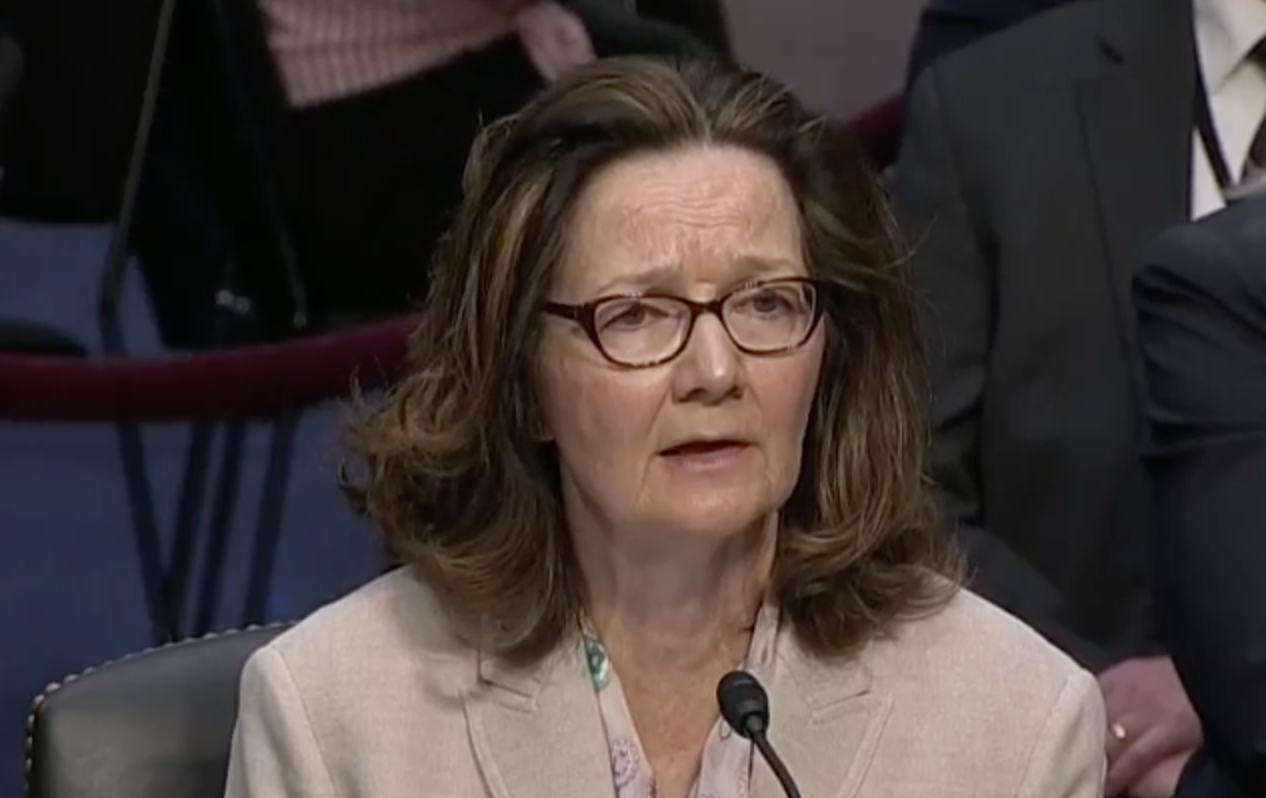Ron Wyden Makes It Clear Gina Haspel Pushed for Torture to Continue in 2005
Among the many, many damning details of Gina Haspel’s confirmation hearing, one sticks out. Ron Wyden asked her whether, during the 2005 to 2007 period, whether she ever asked for the torture program to be continued or expanded. She didn’t answer. Instead, she dodged:
Haspel: Like all of us who were in the counterterrorism center and working at CIA in those years after 9/11, we all believed in our work, we were committed, we had been charged with making sure the country wasn’t attacked again. And we had been informed that the techniques in CIA’s program were legal and authorized by the highest legal authority in our country and also the President. So I believe, I and my colleagues in the counterterrorism center were working as hard as we could with the tools that we were given to make sure that we were successful in our mission.
Wyden: My time is short and that, respectfully, is not responsive to the question. That was a period where the agency was capturing fewer detainees, waterboarding was no longer approved, and especially in light of that Washington Post story, I would really like to have on the record whether you ever called for the program to be continued, which it sure sounds to me like your answer suggested. You said, well we were doing our job it ought to be continued.
This makes it clear that Haspel was involved in reauthorizing torture in 2005, in a process that was as rife with lies to DOJ as the original authorization process had been.
It also makes Haspel directly responsible for the torture of people like Abu Farj al-Lbi, which the torture report describes this way.
On May 2005, one day after al-Libi’s arrival at DETENTION SITE BLACK, CIA interrogators received CIA Headquarters approval for the use of the CIA’s enhanced interrogation techniques on Abu Faraj al-Libi. CIA interrogators began using the CIA’s enhanced interrogation techniques on Abu Faraj al-Libi on May 28, 2005, two days before the OLC issued its memorandum analyzing whether the techniques violated U.S. obligations under the Convention Against Torture.891
The CIA interrogated Abu Faraj al-Libi for more than a month using tlie CIA’s enhanced interrogation techniques. On a number of occasions, CIA interrogators applied the CIA’s enhanced interrogation techniques to Abu Faraj al-Libi when he complained of a loss of hearing,repeatedly telling him to stop pretending he could not hear well.892 Although the interrogators indicated that they believed al-Libi’s complaint was an interrogation resistance technique, Abu Faraj al-Libi was fitted for a hearing aid after his transfer to U.S. military custody at Guantanamo Bay in 2006.893 Despite the repeated and extensive use of the CIA’s enhanced interrogation techniques on AbuFaraj al-Libi, CIA Headquarters continued to insist throughout the summer and fall of 2005 that Abu Faraj al-Libi was withholding information and pressed for the renewed use of the techniques. The use of the CIA’s enhanced interrogation techniques against Abu Faraj al-Libi was eventually discontinued because CIA officers stated that they had no intelligence to demonstrate that Abu Faraj al-Libi continued to withhold information, and because CIA medical officers expressed concern that additional use of the CIA’s enhanced interrogation techniques “may come with unacceptable medical or psychological risks.894 After the discontinuation of the CIA’s enhanced interrogation techniques, the CIA asked Abu Faraj al-Libi about UBL facilitator Abu Ahmad al-Kuwaiti for the first time.895 Abu Faraj al-Libi denied knowledge of al-Kuwaiti.896
That Haspel appears to have pushed to use torture with al-Libi is significant for multiple reasons. First, as noted, the CIA tortured al-Libi immediately after taking him into custody. There was no show of seeing whether he would cooperate. The CIA used his claim of hearing problems — a claim that turned out to be true — as an excuse to do more torture. CIA apparently kept asking to resume torture with him, even though it didn’t work.
Really importantly for the legacy of the torture program, al-Libi not only didn’t reveal the identity of Abu Ahmad al-Kuwaiti while he was being tortured, he continued to lie about it after he was tortured.
But Haspel’s involvement in this might be most problematic given the timing of it. As noted, the CIA asked for custody of al-Libi while they were still getting torture reauthorized; the first two Bradbury memos, authorizing torture and then their use of them in combination, were approved on May 10. As further noted, however, CIA started torturing al-Libi before the last Bradbury memo was signed on May 30. We know from Jim Comey’s memos about that process that DOJ was pushed very hard to approve them. Critically important, however, is that Alberto Gonzales made a case against reapproving torture at the May 31 principals meeting. In spite of DOJ concerns, the principals committee reapproved all the techniques.
That’s because CIA had already started torturing al-Libi. Effectively, CIA (so, presumably, Haspel, among others), rushed to torture al-Libi so that the government would have no choice but to reauthorize it.

